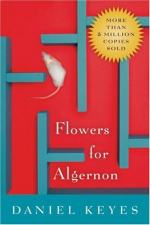|
This section contains 260 words (approx. 1 page at 400 words per page) |

|
Flowers for Algernon Summary & Study Guide Description
Flowers for Algernon Summary & Study Guide includes comprehensive information and analysis to help you understand the book. This study guide contains the following sections:
This detailed literature summary also contains Bibliography and a Free Quiz on Flowers for Algernon by Daniel Keyes.
Originally published as a short story in 1958, Flowers for Algernon appeared as a full-length novel in 1966 and has remained a critical and popular success. The novel is told as a series of "Progress Reports" written by Charlie Gordon, a thirty-two-year-old man whose Intelligence Quotient (IQ) of 68 is tripled by an experimental surgical procedure. Unfortunately, the effects of the operation wear off after several months, and at the end of the novel Charlie is once more of subnormal intelligence. Although originally published as a work of science fiction-the short story won the World Science Fiction Convention's Hugo Award and the novel won the Nebula Award of the Science Fiction Writers of America-Daniel Keyes's story has achieved wide popularity outside the science fiction field. Much of the novel's power comes from Keyes's remarkable use of first-person point of view, as Charlie's entries move from semi-literacy to complex sophistication and back to semi-literacy. And the character of Charlie Gordon is a memorable portrait of alienation, of an individual who is at odds with his society and who struggles to have satisfactory relationships with others. The novel gained additional fame when its 1968 film version, Charly, earned Cliff Robertson an Academy Award as Best Actor for his portrayal of Charlie Gordon. Although some critics have found portions of the novel overly predictable or sentimental, Keyes's most famous work has continued to enjoy great popularity. Over thirty years after publication, Flowers for Algernon is still regarded with both respect and affection by readers within both the science fiction community and the public at large.
Read more from the Study Guide
|
This section contains 260 words (approx. 1 page at 400 words per page) |

|



